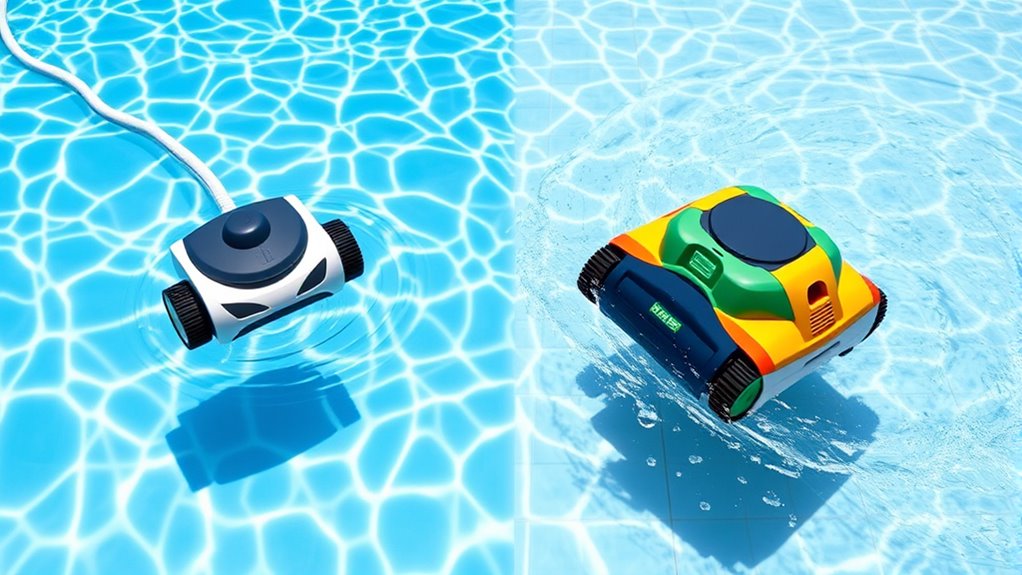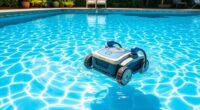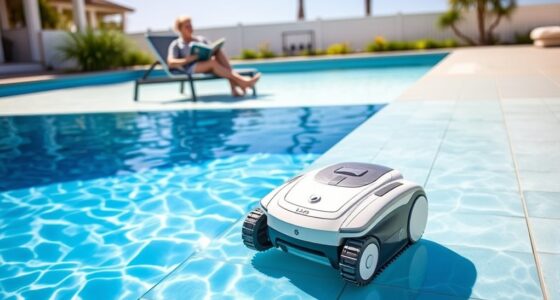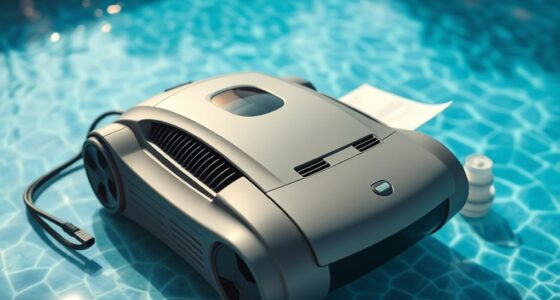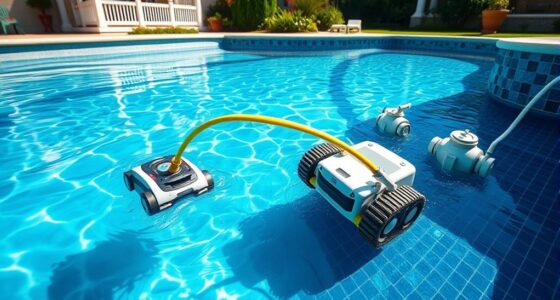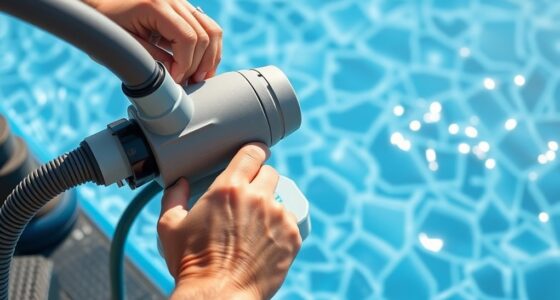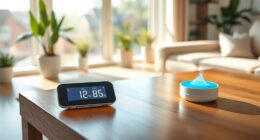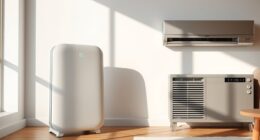Suction pool cleaners connect to your skimmer or dedicated suction line, relying on your pump’s power to pull in dirt and debris from the pool floor and walls. Pressure cleaners, on the other hand, use pressurized water jets to move and scrub surfaces, pushing debris into a separate filter. Each offers different benefits depending on your pool’s size, shape, and surface. To get a clearer picture of their differences and which suits you best, keep exploring further.
Key Takeaways
- Suction cleaners rely on your pool pump’s suction to vacuum debris, while pressure cleaners use pressurized water for propulsion and scrubbing.
- Suction cleaners are ideal for smooth surfaces and small debris, whereas pressure cleaners excel in large, irregular, or freeform pools with larger debris.
- Installation for suction cleaners involves connecting hoses to the skimmer or dedicated line; pressure cleaners require compatibility with pressure ports.
- Suction cleaners generally have lower upfront costs and are suitable for regular maintenance; pressure cleaners are more expensive but handle tougher debris and surfaces.
- Both types require routine filter cleaning and maintenance; choosing depends on pool shape, surface, debris type, and budget.
How Suction Pool Cleaners Operate
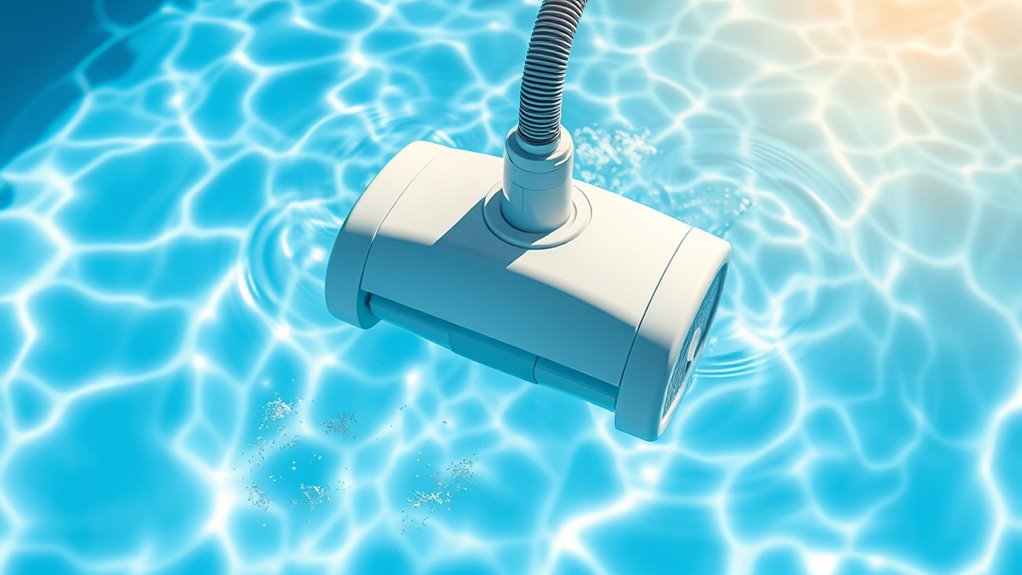
Suction pool cleaners work by attaching to your pool’s skimmer or dedicated suction line and using the pump’s power to move across the pool surface. The cleaner relies on strong suction power to pull in dirt, leaves, and debris from the pool floor and walls. As the cleaner moves, it continuously collects debris into its internal filter or bag, preventing clogs and keeping your pool spotless. Because it depends on your pump’s suction, the cleaner’s effectiveness directly relates to the pump’s strength. With proper setup, your suction cleaner can efficiently cover large areas, removing fine particles and larger debris alike. Additionally, choosing the right filter system can optimize cleaning efficiency based on your pool’s specific needs. Proper maintenance of the pool’s filtration system can also extend the cleaner’s lifespan and improve overall performance. Regular use and inspection help ensure that the suction power remains adequate for effective cleaning. This straightforward operation makes it a popular choice for regular maintenance, especially if you want a quiet, low-maintenance cleaning solution.
How Pressure Pool Cleaners Work
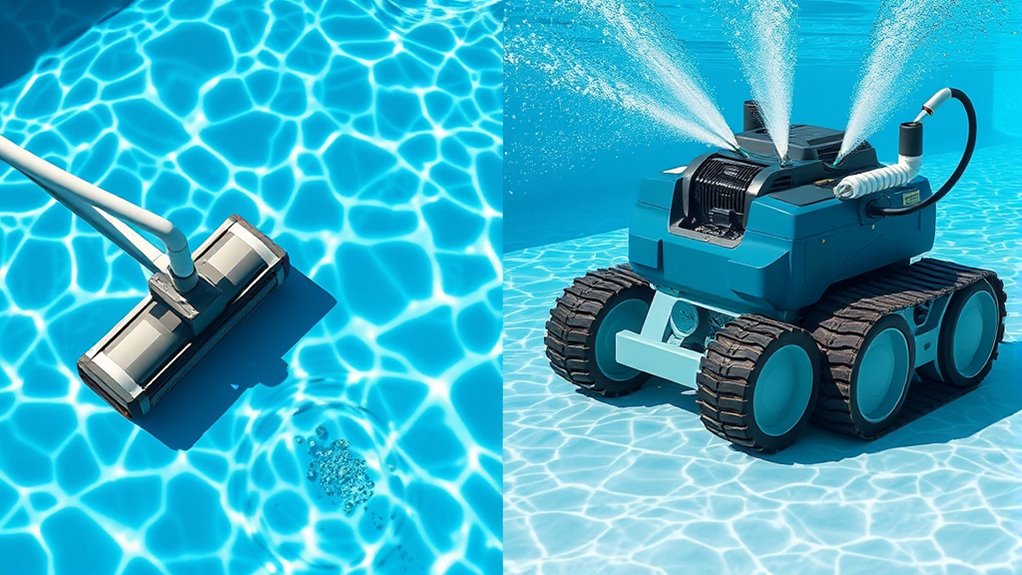
Pressure pool cleaners operate by harnessing the power of pressurized water to move and scrub the pool surfaces. Their cleaning mechanism relies on high water flow, which is directed through jets on the cleaner. As water flows through these jets, it creates thrust, propelling the cleaner around the pool. This movement allows the cleaner to reach all areas, including corners and steps. The water flow also helps dislodge dirt and debris from the pool surfaces, making cleaning more effective. Unlike suction cleaners, pressure models do not rely on suction to pick up debris; instead, they push debris into a separate filter bag or skimmer. This design provides consistent movement and thorough coverage, ensuring your pool stays clean with minimal effort on your part. Proper maintenance of the filter system is also essential to maximize the efficiency of pressure cleaners and prolong their lifespan. Regularly inspecting and cleaning the pressure hose can prevent clogs and maintain optimal water flow, further enhancing cleaning performance. Additionally, understanding the cleaning mechanism can help users troubleshoot issues and optimize operation for better results. Furthermore, advancements in automation technology are making pressure pool cleaners even more efficient and easier to operate.
Installation and Setup Differences
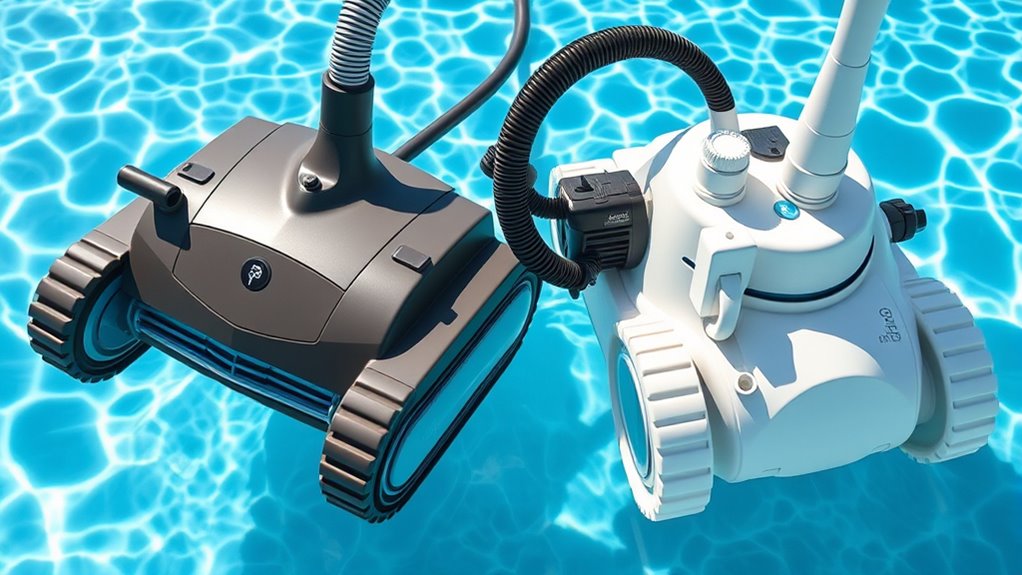
Setting up a pool cleaner requires understanding the specific installation steps for each type. For suction cleaners, you’ll need to connect the hose to a dedicated suction line or skimmer. Verify the pool surface compatibility, as some models work better on certain surfaces like concrete or vinyl. Check that the suction line requirements are met, with clear hoses and proper fittings. Additionally, ensuring the correct installation procedures are followed can prevent common setup issues. Proper setup minimizes installation issues and ensures your cleaner operates efficiently from the start. Regular inspection of the system and understanding how home furnishings components work can also contribute to a smoother setup process. Incorporating data-driven strategies can help you troubleshoot and optimize the installation process for better performance. When installing pressure cleaners, it’s important to confirm that the pressure port is compatible with your pool’s equipment to prevent leaks or pressure loss. Paying attention to system compatibility can significantly impact the longevity and efficiency of the cleaner, reducing the need for repairs and adjustments. Proper setup minimizes installation issues and ensures your cleaner operates efficiently from the start.
Cleaning Performance and Effectiveness
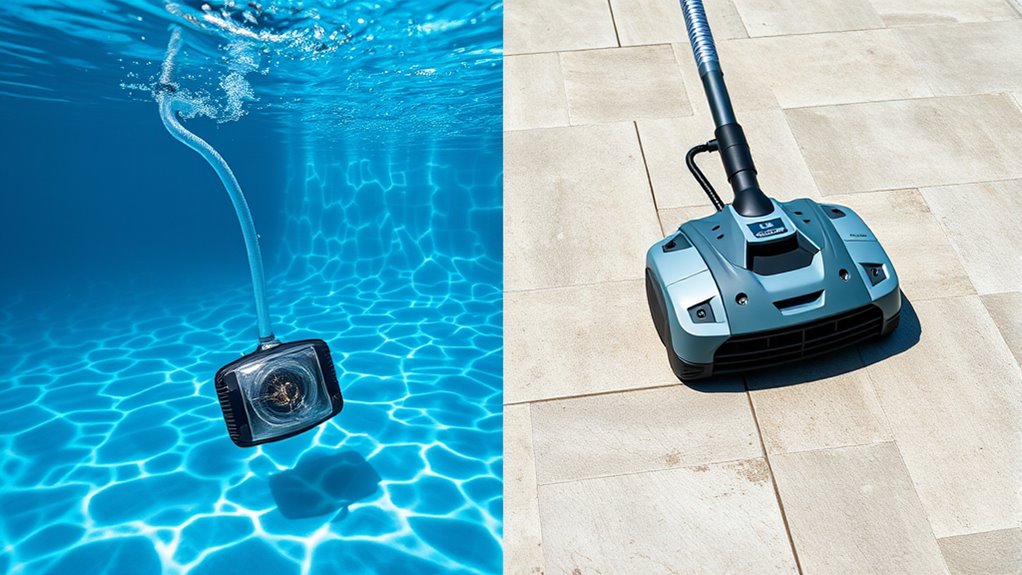
When it comes to cleaning performance, suction pool cleaners excel at thoroughly removing debris from the pool floor and walls, especially smaller particles like dirt and sand. They typically have high filter efficiency, capturing fine debris effectively and preventing it from recirculating. Their debris capacity is usually larger, allowing you to clean longer without frequent emptying. This makes them particularly effective for pools with a lot of fine debris or algae. Additionally, some models incorporate advanced navigation systems to improve coverage and efficiency, though coverage might still be limited to certain areas depending on the design. Proper maintenance of filtration systems can significantly enhance their performance and longevity. Implementing budgeting tips such as regular system checks can help maintain optimal operation. Overall, suction cleaners deliver reliable, efficient cleaning, especially when paired with a good filtration system, ensuring your pool stays crystal clear with minimal effort. Moreover, using an air purifier can improve indoor air quality around your pool area, promoting a healthier environment.
Maintenance and Durability
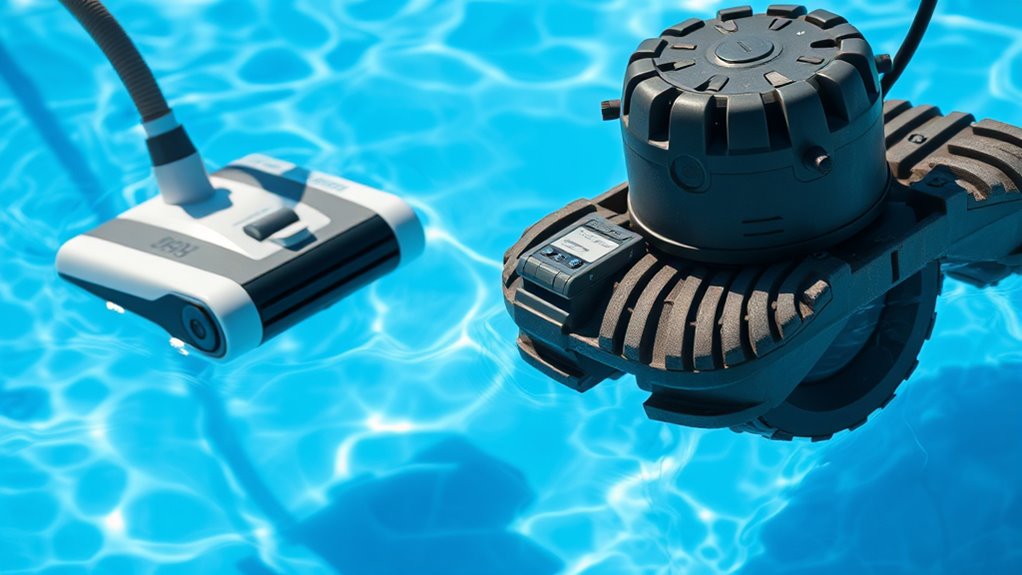
When choosing a pool cleaner, you’ll want to take into account how well it resists wear and tear over time. Some models require more frequent maintenance, which can affect their longevity and your overall costs. Understanding these aspects helps you pick a durable cleaner that fits your maintenance routine. Additionally, considering the technology used in the device can influence its durability and effectiveness over the long term. Advances in materials used in manufacturing can also enhance the overall lifespan of pool cleaners. Being aware of industry trends also ensures you select a model that remains reliable and efficient as newer innovations emerge. Moreover, selecting a model with high-quality materials can significantly impact its lifespan and resistance to harsh pool chemicals. Incorporating vetted product reviews can further assist in making an informed decision about durability and long-term performance.
Wear and Tear Resistance
Pressure pool cleaners generally resist wear and tear better than suction models because their robust construction can withstand more frequent use and exposure to debris. Their durable parts help reduce issues like filter clogging, which can hinder performance and lead to damage. Since pressure cleaners operate with a more powerful motor, they’re designed to handle continuous operation without excessive motor wear. The sturdy body and reinforced components also minimize damage from rough debris or frequent use. This durability means fewer repairs and replacements over time, saving you money and effort. Overall, pressure cleaners are built to endure harsher conditions, making them more reliable and long-lasting, especially if you use your pool frequently or have challenging debris in the water.
Maintenance Requirements
Because pressure pool cleaners are built with durable components to resist wear and tear, they typically require less maintenance over time. You’ll mainly need to monitor the filter for replacement when it gets clogged, which ensures peak performance. Storage needs are minimal; you can easily keep these cleaners in a garage or shed without special conditions. Regularly inspecting and cleaning parts helps prolong their lifespan. Here’s a quick overview:
| Maintenance Task | Frequency | Notes |
|---|---|---|
| Filter Replacement | Every 1-3 months | Depends on usage and debris |
| Storage | Year-round | Keep in a dry, sheltered spot |
| General Inspection | Monthly | Check for wear and tear |
Staying on top of these tasks keeps your pressure cleaner running smoothly and lasts longer.
Cost Considerations and Budgeting
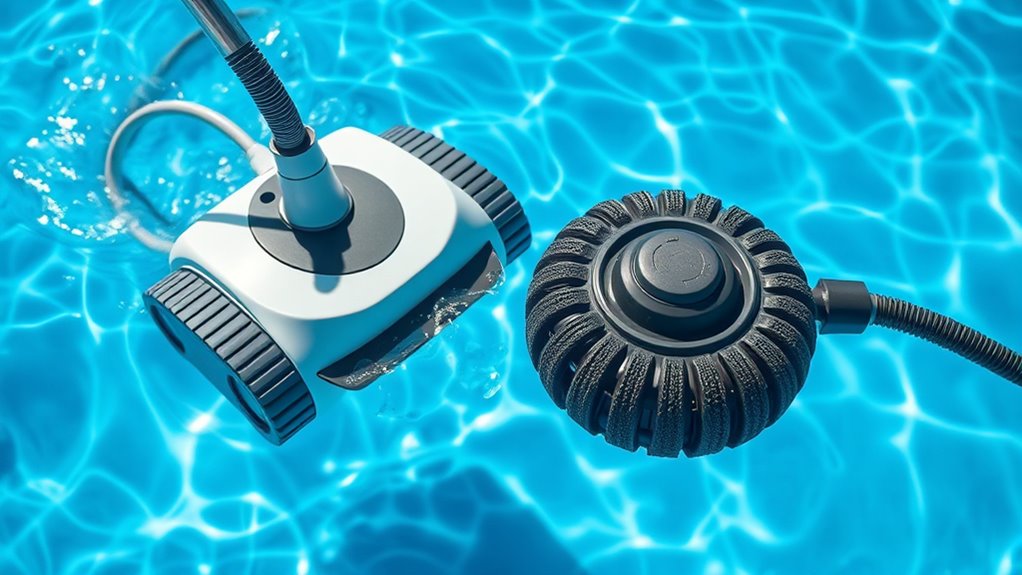
Cost considerations play a crucial role in choosing between suction and pressure pool cleaners, as their prices and ongoing expenses can vary considerably. You need to evaluate your budget constraints and determine what’s affordable for you. Suction cleaners generally have lower upfront costs and simpler parts, making them more budget-friendly initially. However, pressure cleaners tend to be more expensive upfront but can save money over time through faster cleaning and less maintenance. Keep in mind ongoing expenses like replacement parts and energy consumption. If affordability considerations are top priority, a suction cleaner might be the better choice. But if your budget allows for a higher initial investment and you want efficient cleaning, a pressure cleaner could be worth the cost. Always balance upfront costs with ongoing expenses to make the best financial decision.
Ideal Pool Types for Each Cleaner
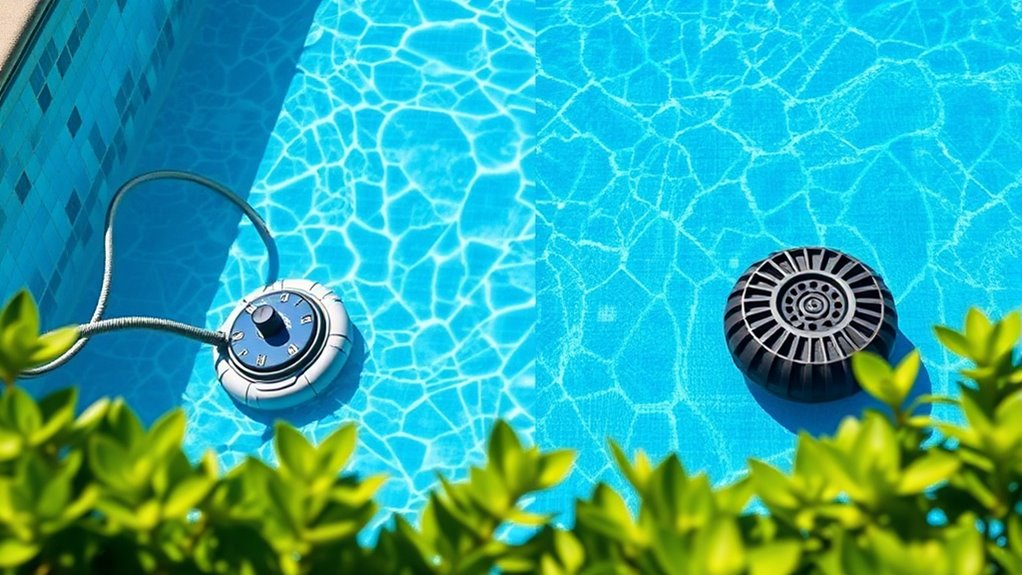
Choosing the right pool cleaner often depends on the type of pool you have. Suction cleaners work best on pools with a smooth surface like concrete, plaster, or fiberglass, where they can easily vacuum dirt and debris. Pressure cleaners are ideal for larger, freeform pools or those with a lot of obstacles, as they maneuver well around irregular surfaces. Water chemistry also plays a role; some cleaners perform better in pools with balanced water chemistry, reducing clogging and maintenance issues. Here’s a quick comparison:
| Pool Type | Suitable Cleaner |
|---|---|
| Smooth surface (concrete, plaster) | Suction cleaner |
| Large, irregular shape | Pressure cleaner |
| High debris load | Both, depending on design |
Match your pool surface and water chemistry to choose the most effective cleaner.
Frequently Asked Questions
Which Cleaner Is Better for Above-Ground Pools?
For above-ground pools, you should consider your pool maintenance needs and cleaning efficiency. Suction pool cleaners are often better because they attach directly to your skimmer or suction port, making them easy to use and effective at cleaning debris. They require less setup and are typically more budget-friendly, helping you keep your pool clean without hassle. Choose one that matches your pool size and debris level for the best results.
How Do Suction and Pressure Cleaners Handle Debris Size?
You might wonder how suction and pressure cleaners handle debris size. Suction cleaners excel at removing small debris, like dirt and leaves, enhancing cleaning efficiency on fine particles. Pressure cleaners, on the other hand, are better suited for larger debris such as sticks or larger leaves, thanks to their stronger force. Your choice depends on your pool’s debris size; smaller debris needs suction, while larger debris benefits from pressure cleaning.
Are Suction or Pressure Cleaners More Eco-Friendly?
Imagine making a choice that’s kinder to the planet. When comparing suction and pressure cleaners, you’ll find suction models often have a lighter eco footprint because they generally consume less energy. They’re efficient in their energy consumption, reducing your environmental impact. Pressure cleaners, while powerful, tend to use more energy, which can increase your overall energy footprint. So, if eco-friendliness matters to you, suction cleaners might be the greener option.
Can Both Cleaners Operate Simultaneously in the Same Pool?
You can’t typically run both suction and pressure pool cleaners simultaneously because of compatibility concerns. Dual operation isn’t usually recommended, as it might strain your pool’s filtration system or cause interference between the cleaners. If you want to maximize cleaning, consider switching between them or using a robotic cleaner designed for combined functions. Always check your pool’s system specifications to avoid damage and guarantee the best performance.
How Do Weather Conditions Affect Cleaner Performance?
You notice how weather impact sneaks into your pool routine just as you’re planning to clean. Temperature effects, wind, and rain can all influence your cleaner’s performance. For example, high winds might blow debris faster, making suction or pressure cleaners work harder. Cold weather can slow down operation, while rain can clog filters. Staying mindful of weather conditions guarantees your cleaner operates efficiently, keeping your pool pristine no matter the forecast.
Conclusion
Choosing between suction and pressure pool cleaners is like selecting the right tool to keep your oasis sparkling. Imagine your pool as a serene lake—each cleaner acts as a gentle hand, guiding debris away to reveal clear, inviting water. Whether you prefer the steady pull of suction or the powerful push of pressure, understanding their differences helps you craft a pristine retreat. With the right cleaner, your pool becomes a tranquil haven, ready for you to plunge in and unwind.
